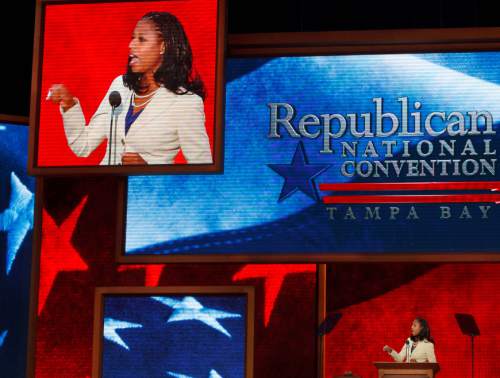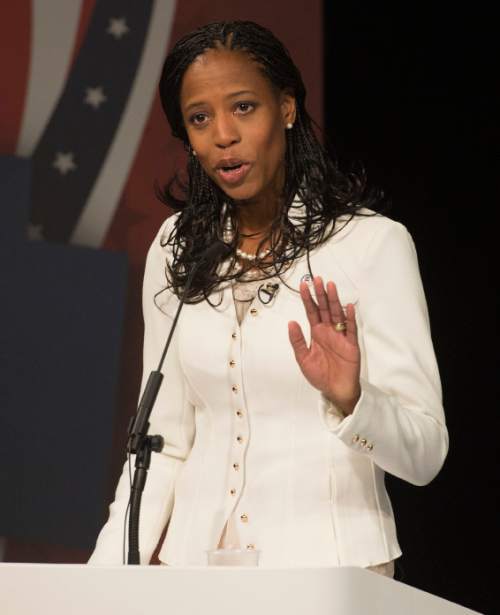This is an archived article that was published on sltrib.com in 2016, and information in the article may be outdated. It is provided only for personal research purposes and may not be reprinted.
Rep. Mia Love has decided to skip the Republican National Convention in Cleveland, giving up her delegate slot to focus on her re-election bid and to go on a congressional trip to Israel.
She saw no benefit in attending the gathering where Donald Trump is expected to claim the party's presidential nomination.
"I don't see any upsides to it," Love said Friday. "I don't see how this benefits the state."
She's the only member of Utah's 40-person delegation to back out of the convention, though others are considering it, largely over opposition to Trump.
Utah Lt. Gov. Spencer Cox previously said: "I have not been supportive of Mr. Trump, and I'm not really excited to go back to a convention that's centered around him. ... There's a chance I don't go."
Cox did not immediately respond to a request for comment Friday.
Love won't say whether she'll vote for Trump in November, though she vehemently rules out voting for Democratic presumptive nominee Hillary Clinton. Love said she's not sure what Trump really believes or wants to do once in office, and she has taken note that he remains deeply unpopular in Utah.
"Being thoughtful and taking my time and not blindly following is representing my district well," she said.
The first-term congresswoman also brushed aside talk that Trump may consider her for his vice presidential nominee, rumors given fresh life Friday by former Trump aide Michael Caputo during an interview with Fox News Radio.
Caputo, who noted he hasn't been in the vice presidential conversations, said: "The two people I think you should look at, and these are unorthodox, first is Mia Love, the congresswoman, somebody who is an African-American leader with really bright ideas and an ability to communicate."
Interviewer Brian Kilmeade asked: "Is there a relationship there?"
Caputo said: "There is. People are looking at her." He then named Sen. Tom Cotton, R-Ark., as his other unorthodox No. 2 pick.
Love told The Salt Lake Tribune that she has never met or spoken to Trump and that she has no knowledge of any relationship between her campaign and his.
Asked if she would consider being Trump's vice president, she said: "I'm endeared and close to the people I represent, and I'm not going to abandon them. I've just gotten started, and there's a lot of work to do."
Earlier in the presidential contest, Love backed Sen. Marco Rubio, R-Fla., and she noted that she ran to be a national delegate when Sen. Ted Cruz, R-Texas, was still in the race. Now that it is just Trump, Love has decided that her time would best be spent in places other than Cleveland.
While delegates gather from July 18 to 21, Love plans to spend some of her time campaigning in the 4th Congressional District; part of her time will be spent in Israel, on an official trip with Rep. Jason Chaffetz, R-Utah, focused on studying ways to fight terrorism.
She attended the last convention in 2012 and gave a prime-time address about her background as a black Republican born to Haitian immigrants that helped make her a national figure within the party.
She has not sought a speaking slot this year, said Love's campaign strategist Dave Hansen, and "one was not offered."
Utah Republican Party Chairman James Evans, who talked to Love about her decision, said he's sure that if party leaders asked her to speak, she would fly in for a day.
"But to spend five days there? She'd rather be in the district, campaigning," he said.
Love is in a tight race against Democrat Doug Owens. A Salt Lake Tribune-Hinckley Institute of Politics poll from early June found Owens had a 6 percentage-point lead. Major national political handicappers have called the race "a tossup."
She beat Owens in 2014 by 5 percentage points, a closer-than-expected margin, and she lost narrowly to Rep. Jim Matheson, D-Utah, in 2012, the year of her convention speech.
Matheson never went to the Democratic conventions, in part because he was often in a tight contest and in part because he didn't want to be directly tied to national figures in the Democratic Party.
Owens is following suit. He is skipping the Democratic convention in Philadelphia, though he did say he'll vote for Clinton in November.
In contrast, the Owens campaign has criticized Love for being a "celebrity" more interested in national politics than the people in her district.
Matthew Burbank, a political scientist with the University of Utah, said Love's decision to skip the convention helps defend against that line of attack.
He said the freshman lawmaker "has been pretty good about keeping her head down and about doing the work of Congress."
And in a state where Trump came in third in the presidential caucus and is struggling in opinion polls, there's no reason to let Democrats use the convention to tie her to the unpredictable candidate.
"By not going, she manages to distance herself from whatever controversy there might be," Burbank said.





